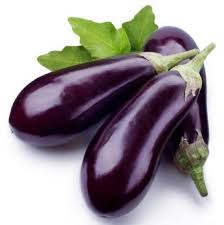 Eggplant is a plant species in the nightshade family Solanaceae.
Eggplant is a plant species in the nightshade family Solanaceae.
Solanum melongena is grown worldwide for its edible fruit.
It is most commonly purple.
A spongy, absorbent fruit used in several cuisines.
Typically used as a vegetable in cooking,
It is a berry by botanical definition.
It is related to the tomato, chili pepper, and potato.
Like the tomato, its skin and seeds can be eaten.
Like the potato, it is usually eaten cooked.
Eggplant is nutritionally low in macronutrient and micronutrient content.
Eggplant has the capability of the fruit to absorb oils and flavors through cooking.
In 2018, China and India combined accounted for 87% of the world production of eggplants.
It is a tropical perennial plant often cultivated as a tender or half-hardy annual in temperate climates.
Ots stem is often spiny, and flowers are white to purple in color, with a five-lobed corolla and yellow stamens.
Some common cultivars are egg-shaped, glossy, and purple with white flesh and a spongy, meaty, texture.
Different cultivars of the plant produce fruit of different size, shape, and color, though typically purple.
The cut surface of the flesh rapidly turns brown by oxidation when the fruit is cut open.
Eggplant grows 1 ft 4 in to 4 ft 11 in tall, with large, coarsely lobed leaves that are 10 to 20 cm (4 to 8 in) long and 5 to 10 cm (2 to 4 in) broad.
Semiwild types can grow much larger.
It is botanically classified as a berry, the fruit contains numerous small, soft, edible seeds that taste bitter because they contain or are covered in nicotinoid alkaloids, like the related tobacco.
Its flowers and leaves can be poisonous if consumed in large quantities due to the presence of solanine.
Nutritional value per 100 g (3.5 oz)
Energy
104 kJ (25 kcal)
Carbohydrates
5.88 g
Sugars
3.53 g
Dietary fiber
3 g
Fat
0.18 g
Protein
0.98 g
Vitamins
Quantity %DV†
Thiamine (B1) 3% 0.039 mg
Riboflavin (B2) 3% 0.037 mg
Niacin (B3) 4% 0.649 mg
Pantothenic acid (B5) 6% 0.281 mg
Vitamin B6 6% 0.084 mg
Folate B9 6% 22 μg
Vitamin C 3% 2.2 mg
Vitamin E 2% 0.3 mg
Vitamin K 3% 3.5 μg
Minerals
Quantity %DV†
Calcium 1% 9 mg
Iron 2% 0.23 mg
Magnesium 4% 14 mg
Manganese 11% 0.232 mg
Phosphorus 3% 24 mg
Potassium 5% 229 mg
Zinc2% 0.16 mg
Water 92 g
Raw eggplant is 92% water, 6% carbohydrates, 1% protein, and has negligible fat.
Eggplant provides low amounts of essential nutrients, with only manganese having a moderate percentage (11%) of the Daily Value.
In 2020, world production of eggplants was 57 million tonnes, led by China with 65% of the total and India with 23%.
The color of purple skin cultivars is due to the anthocyanin nasunin.
The browning of eggplant flesh results from the oxidation of polyphenols, chlorogenic acid.
Nearly 10% of people report some allergic symptoms after consuming eggplant, with 1.4% showing symptoms within two hours.
Contact dermatitis from eggplant leaves and eggplant flower pollen have also been reported.
Individuals genetically predisposed to developing certain allergic hypersensitivity reactions are more likely to have a reaction to eggplant.
Eggplant is high in histamines.
Cooking eggplant thoroughly seems to preclude reactions in some individuals.
